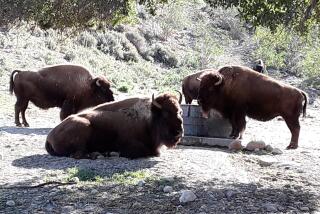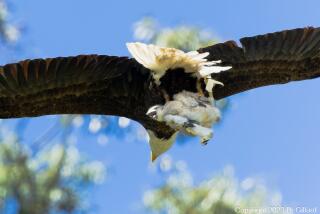Forever Wild
- Share via
Tuffy is a desert donkey; she is undomesticated. That means that she has agreed to live on my uncle’s property with our horses, eat what we provide for her, bray her greetings and complaints, tolerate our company--yet remain aloof and wild.
Now, treating a sick wild donkey is not like treating a horse, dog or cat. Other animals, though nervous or fearful, are on the whole appreciative of human help. Other animals don’t laugh at your efforts or aim a hoof at you with evil intentions. Other animals are not Tuffy.
Tuffy’s hoof-abscess season usually runs August through November, but is worst in September during the Santa Ana winds. However, her latest was in April.
Her very first abscess was in August, 1976. It took me 15 minutes to coax and drag her the 500 feet around the patio to the vet. As I held the lead rope, he talked softly to her, then carefully reached for the infected rear hoof. Tuffy snorted and immediately kicked at his face--which narrowly escaped. After that, he went to his truck and came back with a twitch, a device applied to a horse’s nose and lips to get him to cooperate. It too failed. When it comes to a contest of determination, Tuffy will gladly sacrifice her nose.
Not about to be beaten by a burrito , the vet went back to his truck and returned with a tranquilizer. Two false starts and two needles later, he gave her the injection. He’d plant the needle in her neck, she’d snort, kick, and he’d jump away. On the third try, he succeeded. “Hold onto her head so she doesn’t hurt herself when she goes down,” he said.
Fifteen minutes passed. He gave her another shot, and again she tried to end his career. Tuffy stood in the 95-degree heat, feet planted firmly, eyes unblinking and a decidedly obstinate look on her face. Ten minutes later, the vet gave her a third injection; again she tried to send him into early retirement.
The vet shook his head. “We’ll have to do it the hard way,” he said.
That’s when we enlisted the help of the vet’s 16-year-old son, about 150 pounds, and my friend, Jack, about 170 pounds. The odds were now almost even--four of us to one of her, with Tuffy in the lead.
We planned our approach and surrounded her, and after a three-minute skirmish--it felt like an hour--we sort of decked her. She never really fell over; we just toppled her. I held her head down, the vet’s son sat on her shoulders, and Jack sat on her body. The vet picked her hoof clean, found the bacteria trail, dug out the abscess, drained it, packed it with antiseptic, wrapped it and got away in two minutes flat.
When we released her, she immediately sat up, then stood up and walked indignantly away to collect her reward in carrots. Through it all, she never lost consciousness.
The vet then asked me where the burrito came from. “Her parents lived in the desert,” I said.
“You should have told me she was wild!” he said. “I gave her enough tranquilizers to knock out any horse. Wild animals are much harder to knock out than domesticated animals.”
Tuffy is on her 10th abscess, and her third veterinarian--the first one moved away soon after their bout. Her current vet never tries to tranquilize her. He and I do it the hard way--we tackle her, tie her and pray that the ropes will last through the struggle. Then, I alone take care of her every day for weeks until her hoof heals.
Tuffy is still undomesticated, willful and derisive. She still laughs at my efforts to help her. I can see the laughter in her eyes as I try to get around her back hoofs. She never looks appreciative. She does look expectant; she expects, and gets, oatmeal, carrots or Cornnuts as her reward for my labor.
Yet, sometimes I think I detect a momentary look of respect. I have, after all, survived 10 abscesses, kicks and stomps and one shove into the pipe corral.
More to Read
Sign up for Essential California
The most important California stories and recommendations in your inbox every morning.
You may occasionally receive promotional content from the Los Angeles Times.













